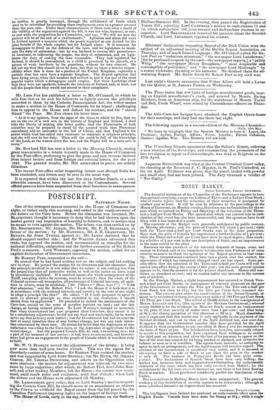POSTSCRIPT.
SATURDAY NIGHT.
One of the strangest scenes occurred in the House of Commons last night, or rather early this morning, and ended in the readjournment of the debate on the Corn.laws. Before the discussion was resumed, Mr. BLACKSTONE thought it necessary to deny that he had thrown upon the landed gentry any imputation of hostility to farmers, and to declare that hemeant to vote against the motion. The debate was then carried .on Mr: BROTHERTON, Mr.- ALDAN, Mr. HUME, Mr. F. H. BERKELEY, _in favour of the motion ; by Mr. HAMPDENi Mr. J. N. GLADSTONE, Mr. BENETT, Sir Jonst TYRELL against it ; Mr. JAMES declared that he Should support neither side ; and Sir WALTER Jestes advocated free trade, but opposed the motion, and recommended as remedies for the national difficulties, emigration and the further extension of Sir Robert Peel's measures. Lord WORSLEY, opposing the motion, called for an explieit declaration of Government intentions.
.SIT-ROBERT PEEL responded to the call— He avowed that he had beard nothing new on the subject, and bad nothing new to state. He praised the motion for its directness and fair character. But tlre,principleinvolved in it was wider than its terms : it was nothing less than the proposition that all protective duties, as well as the duties on corn, must be immediately abolished. If it received assent, the whole arrangement of the Tariff, excepting duties for revenue, must be reversed ; then the whole of the Colonial system—all monopolies, all preferences of Colonial interests, all sacri- fices in return, must be abolished. (Mr. Villiers—" Hear, hear! ") " With that admission," said Sir Robert Peel, " I ask the House if it feels that it is in accordance with the national interests and security by the vote of one night to adopt a principle like this?" He added, " If I were prepared to agree to such en abbtract principle as that embodied in the resolution, I should shrink from its application." He proceeded to defend the continuance of the Corn-law, mainly on the score of peculiar burdens on land ; and the late change, as having, reduced prices. To Lord Worsley's demand he answered, that when, Government last year proposed their Corn-law, they meant it to be a satisfactory adjustment; he did not say Seal and unalterable, for he would never say that as to any such matter ; but the Government had had no reserva- tion or secret intention then of any further change, nor was any such inten- tion entertained by them now, He deniedhis belief that the depression of ma-- nufactnres was owing to the Corn-laws, or the depression of agriculture to the recent change. And the proposed Canada Bill, he said, was nothing, new, but a part of the measure of last session : it had been so announced, and Govern- ineht had given an engagement to the people of Canada which it •was their duty Mt: W. G.- STArtexy moved the adjournment of the debate ; it being new more than half-past twelve o'clock. This was- the signal for a disorderly contest some hours. Sir ROBERT PEEL resisted the motion, and was supported by Lord Jot RUSSELL: but Mr. Moms, Mr. MILNER Gnaw; Mr. Tames BUNCOMBE, and others on the Opposition side, were obstinate: the motion for adjournment was rejected, on two divi- sions by large majprieies; after which, Sir Robert Peel, Lord John Rus- sell, and otherleading Members, left the House : the contest was conti- nued, amid much noise and confusion, until four o'clock ; when both the debate and the House were adjourned till Monday.
Mr. LA.BOUCHERE gave notice, that on Lord Stanley's motion respect- ing the Canada Corn Bill, he should move as an amendment an address to the Crown to withhold the Royal assent from the bill passed by the Canadian Parliament'imposing duties on the import 'of foreign corn.
The Rouse of Lords; early: in the day, heard evidence on the Sudbury
Disfranchisement Bill. In the evening, they passed the Registration of Voters Bill ; rejecting Lord CAMPBELL'S motion to omit clauses 71 and 72, which enfranchise 501. joint-tenants and disfranchise trustees in oc- cupation. Lord BREADALBANE renewed his question about the Scottish Church, and Lord ABERDEEN repeated his answer.


























 Previous page
Previous page